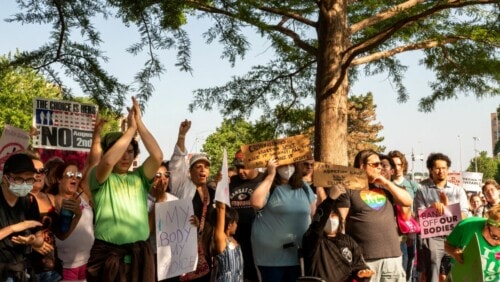Positive Polling Doesn’t Guarantee Victory for Abortion Rights Missouri May Vote on Constitutional Amendment in 2024
Published July 5th, 2023 at 11:19 AM
Above image credit: Attendees of the Kansans for Constitutional Freedom watch party celebrate after primary election results verify Kansans voted to keep abortion a constitutional right. (Lily O’Shea Becker | Kansas Reflector)Polls show that most Americans, even in red states, oppose the strict abortion bans Republican state lawmakers have enacted in the year since the U.S. Supreme Court struck down Roe v. Wade.
Emboldened by that fact, abortion rights advocates in multiple states might propose ballot initiatives for voters to consider in next year’s election, if not before. Last year, voters in six states — including conservative Kansas, Kentucky and Montana — endorsed abortion rights when presented with abortion-related ballot questions.
But in several states, Republicans have scrambled the political calculus by making it more difficult to place initiatives on the ballot or by requiring a supermajority of voters to approve them. GOP lawmakers had mixed success with such efforts this year, but they are likely to continue to push them in hopes of raising the barriers before the 2024 election.
GOP officials also could short-circuit ballot measures by, for example, tinkering with their language or rejecting the signatures on petitions, abortion rights supporters worry.
Maryland and New York are so far the only states where abortion rights measures are officially on the 2024 ballot. Each of those initiatives, placed on the ballot by legislators, would enshrine abortion rights in the state constitution. Voters in those deep-blue states almost certainly will approve them.
Everywhere else, the prospects for getting a citizen-generated abortion rights measure on the ballot, let alone winning voters’ approval, is murkier.
Many activists on both sides of the abortion debate are focused on Ohio, where abortion rights supporters must submit the required number of signatures by July 5. The courts have temporarily halted Ohio’s abortion ban, which prohibits the procedure as early as six weeks into a pregnancy — before most women know they’re pregnant.
Abortion rights supporters are expected to land a “right to reproductive freedom” amendment on this November’s ballot. Polls suggest that most Ohioans will support it: One survey conducted last fall found that 59.1% of Ohio registered voters favor enshrining abortion rights in the state constitution, compared with just 26.7% who oppose it.
But the initiative’s fate may hinge on another election Aug. 8, which Republicans scheduled in May. In that election, Ohio voters will be asked to raise the threshold for passing constitutional changes from a simple majority to 60%.
Ballot measures are a very powerful and attractive tool when there is this large gulf between public opinion and the actions of elected politicians.
– Kelly Hall, Fairness Project executive director
Earlier this year, GOP backers of raising the threshold in the Buckeye State insisted their intent was to protect the state constitution from “outside influence and special interests,” as the House sponsor of the measure, Republican state Rep. Brian Stewart, put it when he filed the bill. But in a letter obtained late last year by The (Cleveland) Plain Dealer, Stewart made it clear to his House colleagues that his goal was to thwart an abortion rights amendment.
“After decades of Republicans’ work to make Ohio a pro-life state, the Left intends to write abortion on demand into Ohio’s Constitution,” Stewart wrote. “If they succeed, all the work accomplished by multiple Republican majorities will be undone, and we will return to 19,000+ babies being aborted each and every year.”
The other state where abortion rights advocates are actively pushing a constitutional amendment is Florida, where a coalition of groups announced in May a drive to put a measure on the November 2024 ballot. They launched their effort less than a month after Florida Republican Gov. Ron DeSantis signed into a law a bill banning abortions after six weeks of pregnancy.
As in Ohio, polls suggest that most Floridians don’t like strict abortion bans. In one survey conducted earlier this year by the University of North Florida Public Opinion Research Lab, 62% of registered Florida voters said they strongly opposed a six-week ban without exceptions for rape and incest. Only 13% said they were strongly in favor.
But the law DeSantis signed does allow abortions up to 15 weeks for victims of rape, incest and human trafficking. And it will take more than a simple majority of voters to amend the constitution: A bill that would have raised the standard to nearly 67% failed, but Florida already requires a 60% supermajority.
In other states that allow citizen-generated initiatives, including Arizona, Arkansas, Missouri, Montana, Nebraska and Oklahoma, abortion rights advocates might pursue ballot initiatives but are still mulling their options, according to Kelly Hall, executive director of the Fairness Project, which backs progressive state ballot measures across the country and is consulting with activists in those states.
In each place, Hall said, advocates would have to file proposed ballot language and form committees before Labor Day to qualify for the 2024 ballot. She cautioned, however, that just because surveys show a growing majority of Americans oppose strict abortion bans doesn’t mean ballot initiatives are sure to succeed, or that they are the right strategy in every state.
“Ballot measures are a very powerful and attractive tool when there is this large gulf between public opinion and the actions of elected politicians,” Hall told Stateline. “Framed through that general high-level lens, you would expect advocates to not think twice and to move into that gap where they know public opinion is on their side and to pass ballot measures.”
But, Hall added, “the newspaper story polling you read about — and we do think it reflects public opinion — is a very shallow look at public opinion.” Some surveys don’t focus on likely voters, she explained, or they ask questions in a way that doesn’t resemble the legalese that tends to end up on the ballot.
And, she said, state officials who are hostile to an initiative can alter the wording so that it is less palatable to voters or derail it by refusing to certify signatures.
As in Ohio and Florida, Republicans anticipating abortion rights ballot initiatives elsewhere have tried to raise barriers to amending the constitution.
In Missouri, for example, the state Senate adjourned in May without taking up a House-passed measure that would have raised the threshold for passage of constitutional amendments to 57%. Missouri bans abortion “except in cases of medical emergency.”
Shortly after the constitutional amendment proposal died, Republican House Speaker Dean Plocher lashed out at GOP senators.
“I think we all believe that an initiative petition will be brought forth to allow choice,” Plocher said a week later. “I believe it will pass. Absolutely.”
But Missouri GOP leaders have pledged to revive the threshold measure next year. Meanwhile, abortion rights supporters, who announced in March that they would seek to put a constitutional amendment on the ballot, were delayed in collecting signatures because of a dispute among Republican state officials over the amendment’s fiscal impact. Fiscal notes are required on the signature forms.
Republican state Auditor Scott Fitzpatrick in March estimated that the measure would cost the state nothing and reduce local tax revenues by about $51,000 annually. But GOP Attorney General Andrew Bailey countered that it could cost the state up to $51 billion because of $12.5 million in lost Medicaid revenue to Catholic hospitals and the lost tax revenues of residents who wouldn’t be born. A judge has ordered the attorney general to accept the auditor’s estimate.
Hall, of the Fairness Project, said supporters of constitutional amendments often must clear such hurdles to get their measure onto the ballot.
“There are lot of steps in the complex process of putting a constitutional amendment forward to voters,” she said. “The ultimate impact is incredibly powerful, but it does mean that you have gone through a lot of work, a lot of scrutiny, a lot of bureaucratic red tape to actually get that question in front of voters.”
Scott S. Greenberger is the executive editor of Stateline, part of States Newsroom, a network of news bureaus supported by grants and a coalition of donors as a 501c(3) public charity. The Missouri Independent, where this story first appeared, also is part of States Newsroom.




